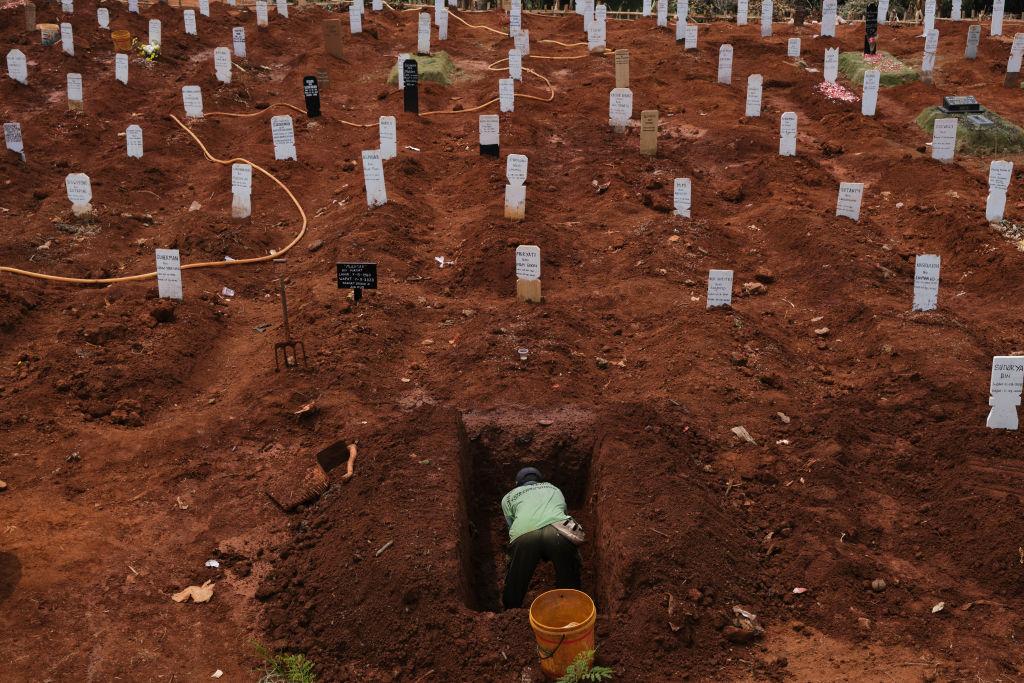
In mid-September, Jakarta governor Anies Baswedan reinstated a partial lockdown in a bid to prevent the Indonesian capital’s hospitals from being overwhelmed. With nearly 12,000 active cases of Covid-19 in the city, ICU beds were projected to reach full capacity within six days.
The lockdown was moderate by international standards. People were required to remain at home, work from home if possible and wear masks when outside. Schools were closed and lessons were conducted online, and 11 essential sectors, including public markets and transport, were permitted to operate at a reduced capacity.
But contradictory lockdown regulations and disciplinary procedures by local and central governments left many people confused or unwilling to comply.
On 15 October, after a steady drop in case numbers, Baswedan announced that some of the restrictions on Jakarta’s residents and businesses would be gradually relaxed. These reduced measures may be insufficient, considering the pandemic’s pressure on Indonesia’s already vulnerable healthcare system. The isolation and ICU wards in Jakarta’s Covid referral hospitals were around 65% full at the time of the announcement.
Indonesia’s national health scheme, Jaminan Kesehatan Nasional (JKN), is nevertheless an impressive program both in ambition and reach. Initiated in 2013 by President Susilo Bambang Yudhoyono’s government, the JKN aims to provide affordable, comprehensive health and dental care to over 221 million Indonesians. With around 96 million low-income earners accessing treatment at no cost, the JKN has transformed Indonesian healthcare from a luxury expense to a widely accessible service.
Primary healthcare is provided through thousands of small community health centres known as Puskesmas, from which patients can be referred to hospitals for secondary and tertiary treatment. However, the standard of healthcare varies, and some regional areas lack services provided in urban centres.
Structurally, the JKN is comparable to England’s National Health Service. It’s a state-run health organisation funded by both government and some patient contributions, which operates at a deficit.
But, even before Covid, the sheer number of non-contributing patients in Indonesia made the program financially unsustainable. Only around 8% of healthcare recipients are paying members. There’s no mechanism to collect outstanding payments, and it’s estimated that 40% of booked contributions remain unpaid. Recently the JKN has required significant government bailouts, sparking public discussion on whether low-income Indonesians should start paying monthly fees.
When Covid emerged, the JKN was financially compromised and vulnerable. Gadjah Mada University epidemiologist Riris Andono warned, ‘It’s not good. We are not prepared.’ He described shortages of intensive care facilities, personal protective equipment and other crucial equipment, including ventilators.
Some members of the international community have stepped up. China has donated several tonnes of PPE and Covid testing equipment. In May, Japan delivered 12,200 Avigan influenza tablets to Indonesia to mark the two nations’ cooperation in the fight against Covid.
Australia donated US$4.2 million in June through the World Health Organization to strengthen Indonesia’s laboratories and help protect patients and workers at health facilities. New Zealand committed NZ$5 million to UNICEF towards Indonesia’s Covid response.
Indonesian officials have been reassuring the public that inequalities in the health system won’t hinder or delay access to a Covid-19 vaccine once one is available. The chair of Indonesia’s Covid Taskforce described Indonesia’s approach to vaccine negotiations as ‘aggressive’, noting it has ‘already secured the vaccines from several partners’.
In September, Indonesia renewed its agreement with UNICEF, safeguarding the nation’s access to potential vaccines for Covid-19 and other illnesses far below the likely market price, and ensuring affordable national distribution.
Indonesia has welcomed international collaboration in vaccine research. Its Bio Farma pharmaceutical company is trialling a vaccine locally in Bandung with China’s Sinovac Biotech, using Indonesian volunteers. Mayor of West Java Ridwan Kamil went so far as to suggest that government officials should volunteer for the trial.
Alongside Sinovac Biotech, China’s Sinopharm and CanSino have pledged to supply their Covid vaccines to Indonesia. All three companies are aiming to begin delivery in November. To further ‘accelerate’ its vaccine access, Indonesia recently sent a team of officials to China to carry out inspections at each of the companies.
The November timelines are both ambitious and optimistic, particularly given that all three companies are still conducting clinical trials.
So, how will Indonesia’s healthcare system fare in the interim?
Indonesia lacked sufficient medical staff prior to Covid, with only 0.2 general practitioners and 1.4 nurses per 1,000 people in 2019. Trainees are overseeing Covid testing to free up health workers in hospitals, but high infection rates and unrelenting demand are taking a huge toll.
Death rates for healthcare workers are among the highest globally. By mid-September, Indonesia had already lost 115 doctors and at least 82 nurses, and thousands more have contracted the virus, forcing health facilities to close.
High community transmission among civilians and healthcare workers, low rates of testing and overwhelmed health facilities are being met with only moderately strict and inconsistent lockdown regimes. This puts patients at risk and significantly restricts the health care that the system can provide.
The pandemic has exposed key vulnerabilities in Indonesia’s health security and sharpened calls for reform.
US management consultants McKinsey & Company has said that if these vulnerabilities are met with policy changes, structural and financial reform, and a renewed focus on personnel training and supply chains, Indonesia could emerge with much stronger health security in the long term.
But in the meantime, the toll is rising. While government rhetoric focuses on a hypothetical vaccine, the healthcare sector needs more attention now.